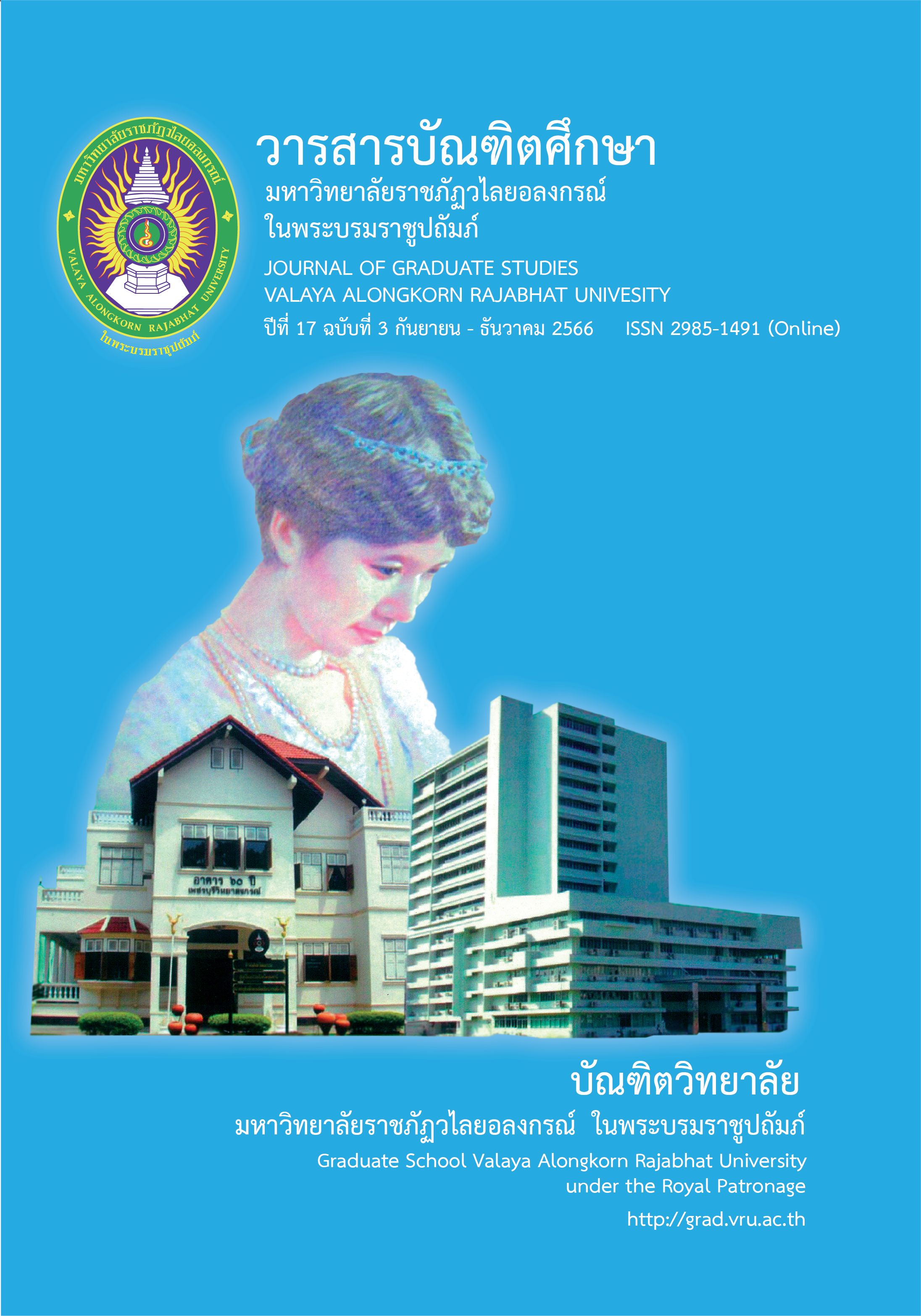THE NEEDS ASSESSMENT OF DISTANCE LEARNING TELEVISION (DLTV) TO IMPROVE THE QUALITY OF EDUCATION FOR SMALL SCHOOLS UNDER THE OFFICE OF THE BASIC EDUCATION COMMISSION
Main Article Content
Abstract
The objective of this research was to assess the needs assessment of distance learning television (DLTV) to improve the quality of education for small schools under the office of the basic education commission. According to the guidelines in related to 6 aspects: Fundamental factors and resources, management, teaching management, supervision, monitoring, evaluation, networking and student learning behavior. The sample included 375 administrators and 375 teachers in the school under of the office of the basic education commission, a total of 375 schools used the school as a random unit. The sample size was determined by using Krejcie & Morgam’s tables and using simple random sampling. In each randomly chosen school, one administrator and teacher responsible for the project represent the school. The instruments used in this study was 5 level rating scale dual response format questionnaire with a reliability from 0.828 -0.989. The statistics used for the analysis were percentage, mean, standard deviation and PNI modified.
The research findings were as follows: Overall and for each individual aspect, the mean of the condition what should be was higher than mean of actual condition. Overall, the actual condition was at a high level but the condition what should be were at a highest level. The needs assessment of distance learning television (DLTV) to improve the quality of education for small schools under the office of the basic education commission found that the most important need of Networking (PNI modified = 0.22), followed by the Fundamental factors and resources (PNI modified = 0.20), Student learning behavior (PNI modified = 0.16), Teaching management (PNI modified = 0.12), Supervision, monitoring, evaluation (PNI modified=0.10) and Management (PNI modified = 0.03), respectively.
Article Details

This work is licensed under a Creative Commons Attribution-NonCommercial-NoDerivatives 4.0 International License.
บทความทุกเรื่องได้รับการตรวจความถูกต้องทางวิชาการโดยผู้ทรงคุณวุฒิ ทรรศนะและข้อคิดเห็นในบทความ Journal of Global of Perspectives in Humanities and Social Sciences (J-GPHSS) มิใช่เป็นทรรศนะและความคิดของผู้จัดทำจึงมิใช่ความรับผิดชอบของบัณฑิตวิทยาลัย มหาวิทยาลัยราชภัฏวไลยอลงกรณ์ ในพระบรมราชูปถัมภ์ กองบรรณาธิการไม่สงวนสิทธิ์การคัดลอก แต่ให้อ้างอิงแหล่งที่มา
References
Charoenphon, A. & Phophakdi, P. (2006). nǣo damnœ̄n kānčhatkān sưksā thāng klai phān dāothīam samrap sathān sưksā [Guidelines for Managing Distance Education via Satellite for Educational institutions]. (2nd ed). Bangkok: Amarin Printing and Publishing Public Company Limited.
Cronbach, L. J. (1990). Essentials of Psychological Testing (5th ed.). Harper Collins, New York.
Fucharoen, A. (2014). rāingān kānwičhai læ phatthanā rūpbǣp kānčhatkān sưksā dūai theknōlōyī kānsưksā thāng klai phư̄a phatthanā phon samrit thāngkān rīan [Research and Development of Educational Management Model with Distance Education Technology to Improve Learning Achievement]. Suphanburi Primary Educational Service Area District Office 1.
Kanjanawasee, S. et al. (2014). kān wat læ pramoēn samatthana khō̜ng bukkhalākō̜nwichāchīp [Measurement and evaluation of professional personnel competencies]. Journal of Social Sciences Research Year. 2014. 1-24.
Krejcie, R. V. & Morgan, D. W. (1970). Determining sample size for research activities. Educational and Psychological Measurements. 1970(30), 607-610.
Office of the Basic Education Commission. (2020). kānphatthanā rūpbǣp kānčhatkān rīan kānsō̜n dōi chai kānsưksā thāng klai phān dāothīam (DLTV) thī prasop khwāmsamret khō̜ng rōngrīan samnakngān khana kammakān kānsưksā naphư̄n thān [The development of Successful Teaching and Learning Management Model using Satellite Distance Education (DLTV) of Schools under the Office of the Basic Education Commission]. Center for the Development of Educational Quality through Distance Education Technology under the Office of the Basic Education Commission. Bangkok.
Office of the Basic Education Commission. (2015). rāingān phonlakā rō̜dam nœ̄n khrōngkān kānčhatkān sưksā dōi chai kānsưksā thāng klai phān dāothīam (DLTV) samnakngān khana kammakān kānsưksā naphư̄n thān [Project Report on Educational Management using Satellite Distance Education (DLTV) under Office of the Basic Education Commission]. Center for the Development of Educational Quality through Distance Education Technology under the Office of the Basic Education Commission. Bangkok.
Rodkroh, P. (2020). nǣothāng kānčhatkān rīan kānsō̜n thī songsœ̄m kānchai theknōlōyī sārasonthēt læ kānsư̄sān yāng mī khunnatham čhariyatham sārap nakrīan chan prathomsưksā [Instructional guidelines to enhance the use of information and communication technology with morality and ethics for elementary students]. Journal of Graduate Studies Valaya Alongkorn Rajabhat University. 14(3), 241-260.
Seangcheewong, S. (2011). nǣothāng kānphatthanā kānčhatkān sưksā thāng klai phān dāothīam khō̜ng phūbō̜rihān rōngrīan nai khēt phư̄nthī kānsưksā prathom sưksā Pathum Thānī khēt sō̜ng [Guidelines for the development of remote education management via satellite for school administrators in Pathum Thani Primary Education Area, District 2]. Master of Social Work Thesis, Program of Social Welfare Administration and Policy, Graduate School, Thammasat University.
Sinlarat, P. (2017). khit phalit phāp sō̜n læ sāng dai yāngrai [Productive Thinking, how to teach and create]. Bangkok: Chulalongkorn University Book Center.
Srisa-ard, B. (2011). kānwičhai bư̄angton [Introduction to research]. 9th Ed. Bangkok: Suweeriyasarn.
Suphawankit, S. (2003). kānsưksā thāng klai rīan yāngrai čhưng čha sū khwāmsamret [Distance education how to be successful]. Siam Rath newspaper. Page 7.
Witkin, B. R. & Altschuld, J. W. (1995). Planning and Conducting needs assessments. A practical guide. Thounsand Osk, CA: Sage Publication. Inc.
Wongwanit, S. (2005). kānwičhai pramoēn khwāmtō̜ngkān čhampen [Needs assessment research]. Bangkok: Chulalongkorn University.


